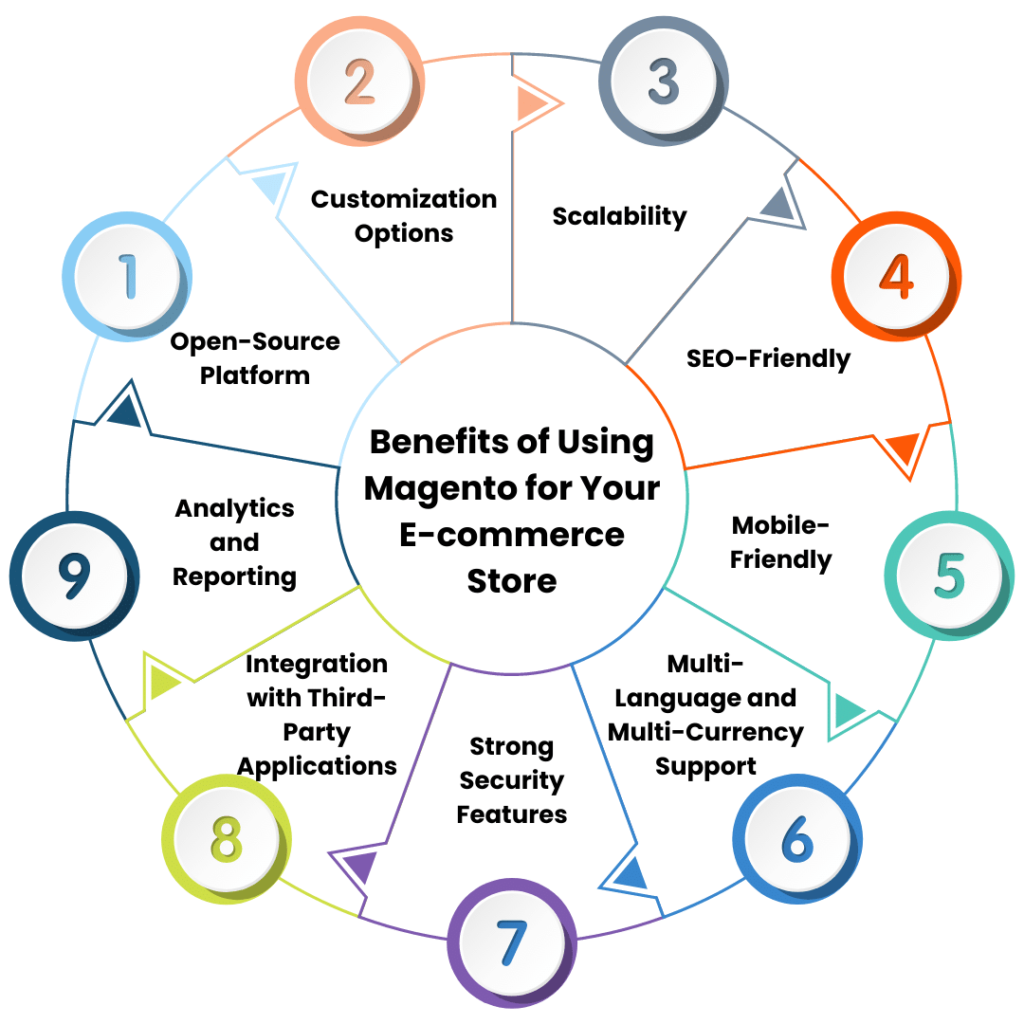Introduction
The e-commerce store industry is booming, and it’s no surprise why. With the convenience and accessibility of online shopping, more and more consumers are turning to e-commerce for their shopping needs. As a result, businesses are starting to recognize the importance of having an online presence. But with so many e-commerce platforms to choose from, how do you know which one is right for your business?
One platform that has gained popularity in recent years is Magento. Magento is an open-source e-commerce platform that offers a wide range of features and customization options. In this article, we will explore the benefits of Magento for your e-commerce store and how it can help take your business to the next level.
Benefits of Magento for Your E-commerce Store
Open-Source Platform
One of the biggest benefits of Magento is that it is an open-source platform. This means that the source code is freely available for developers to modify and customize as needed. With an open-source platform, you have complete control over your e-commerce store and can make changes to suit your specific business needs. This also means that there is a large community of developers constantly working to improve the platform and provide support to users.
Want to increase your website’s performance and user experience? Find out why Magento is the perfect choice for your e-commerce store. Contact Us.
Customization Options for your E-commerce Store
Another major benefit of using Magento is the extensive customization options it offers. With Magento, you can fully customize your e-commerce store to reflect your brand and cater to your target audience. This includes everything from the design and layout of your store to the functionality and features you offer. Magento also has a large library of plugins and extensions that can be added to your store to enhance its functionality and improve the user experience.
Scalability
As your business grows, your e-commerce store needs to grow with it. Magento is designed to be scalable and can easily accommodate the needs of businesses of all sizes. Whether you are just starting out or have an established e-commerce store, Magento can scale to meet your needs. This means that you won’t have to switch platforms as your business grows, saving you time and money in the long run.
SEO-Friendly E-commerce Store
In today’s digital age, having a strong online presence is essential for any business. This includes optimizing your e-commerce store for search engines to increase visibility and drive traffic to your site. Magento is designed with SEO in mind and offers a range of built-in features that can help improve your search engine rankings. This includes everything from customizable URLs and meta tags to sitemaps and integrated Google Analytics.
Mobile-Friendly E-commerce Store
With more and more consumers using their mobile devices to shop online, having a mobile-friendly e-commerce store is crucial. Magento is optimized for mobile devices and offers a responsive design that automatically adjusts to fit the screen size of any device. This ensures that your e-commerce store looks great and functions seamlessly on any device, whether it’s a smartphone, tablet, or desktop computer.
 E-commerce Store with Multi-Language and Multi-Currency Support
E-commerce Store with Multi-Language and Multi-Currency Support
If your business caters to customers from around the world, having a multi-language and multi-currency e-commerce store is essential. Magento offers built-in support for multiple languages and currencies, making it easy to sell your products to customers in different regions. This also includes support for different tax rates and shipping methods, ensuring a seamless shopping experience for your customers no matter where they are located.
Don’t miss out on the benefits of Magento for your e-commerce store. Contact us to discover how to boost your sales!
E-commerce Store with Strong Security Features
With the rise of online shopping, cyber attacks have become a real concern for businesses. Protecting your e-commerce store and your customers’ personal and financial information is crucial. Magento offers strong security features, including built-in encryption, two-factor authentication, and the ability to customize security settings to meet your specific needs. This ensures that your e-commerce store and your customers’ information are protected from cyber threats.
E-commerce Store Integration with Third-Party Applications
Magento offers seamless integration with a wide range of third-party applications, such as payment gateways, shipping providers, and marketing tools. This makes it easy to add new functionality to your e-commerce store and streamline your business processes. For example, you can integrate your store with popular payment gateways like PayPal and Stripe, or use marketing automation tools like Mailchimp to create targeted email campaigns.
Analytics and Reporting
To grow your business, it’s important to track your e-commerce store’s performance and make data-driven decisions. Magento offers a range of built-in analytics and reporting tools that can help you track key metrics like sales, conversion rates, and customer behavior. This data can be used to optimize your store’s performance and make informed decisions about your marketing and sales strategies.
FAQs
Q: Is Magento difficult to use for beginners?
A: While Magento may have a steeper learning curve than some other e-commerce platforms, it offers extensive customization options and scalability that make it worth the effort. Additionally, there are plenty of resources available online to help beginners get started with Magento, including tutorials and forums.
Q: How much does Magento E-commerce Store cost?
A: Magento offers both a free Community Edition and a paid Enterprise Edition. The Community Edition is free to download and use, but you will need to pay for hosting, domain registration, and any additional plugins or extensions you want to add to your store. The Enterprise Edition is designed for larger businesses and comes with additional features and support, but it comes with a higher price tag.
Q: Can I migrate my existing store to Magento?
A: Yes, Magento offers migration tools and services to help you transfer your existing store to the Magento platform. However, it’s important to note that migration can be a complex process and may require the help of a developer.
Read these 8 Reasons Why You Should Hire a Professional Magento Developer
Q: What are the pros and cons of Magento?
A: Pros of Magento:
- Feature-rich and Flexible: Magento is a powerful and feature-rich platform, offering a wide range of tools and functionalities to build highly customizable online stores. It caters well to both small businesses and large enterprises.
- Open-source Platform: Being open-source, Magento is freely available, allowing developers to modify and customize the code to suit specific business needs. This also means a large community of developers contributes to its improvement and support.
- Scalability: Magento can handle large and complex online stores with a high volume of products and traffic. It is designed to scale, making it suitable for businesses expecting significant growth.
- Customization Options: Magento provides a plethora of themes and extensions in its marketplace, allowing users to customize their online stores and add new features easily.
- SEO-friendly: Magento is well-optimized for search engines, which can help improve your store’s visibility and ranking in search results.
- Multi-store Capability: With Magento, you can manage multiple online stores from a single admin panel, making it convenient for businesses with multiple brands or international operations.
Cons of Magento:
- Complexity: Magento’s robustness can also make it complex, especially for those with limited technical knowledge. Setting up and maintaining a Magento store often requires the assistance of experienced developers.
- Resource-intensive: Magento’s feature-rich nature demands more server resources compared to some other e-commerce platforms. This can lead to higher hosting costs and slower performance on inadequate hosting plans.
- Cost of Extensions: While there are many free extensions available, some essential features may require premium, paid extensions. This can add to the overall cost of running a Magento store.
- Upgrades and Maintenance: Keeping Magento and its extensions up-to-date can be time-consuming and may cause compatibility issues. Regular maintenance is necessary to ensure security and performance.
- Learning Curve: Due to its complexity, merchants and store administrators may need to invest more time in understanding the platform, which could be a challenge for those with limited technical expertise.
- Community Support: While there is a large Magento community, the support available might not be as fast or comprehensive as with some other paid platforms that offer dedicated support teams.
Q: What are the benefits of using Magento into an eCommerce website?
A: Magento is a feature-rich and flexible open-source platform for eCommerce websites. It offers customization options, scalability, SEO-friendliness, multi-store capability, and mobile responsiveness. With strong security, a supportive community, and integration capabilities, it’s suitable for businesses of all sizes, providing a robust online shopping experience.
Q: What are the advantages of Magento 2?
A: Magento 2 brings several advantages, including improved performance and speed, simplified checkout process, mobile responsiveness, user-friendly admin interface, modular architecture, better integration capabilities, advanced SEO features, easier upgrades, enhanced security, and full-page caching. These improvements make it a powerful and user-friendly platform for eCommerce websites.
Q: What are the top features of Magento?
A: Magento offers a powerful eCommerce platform with top features like product management, user-friendly design, streamlined checkout, SEO tools, order and customer management, multi-store support, marketing tools, analytics, mobile commerce, security features, integrations, international support, and performance optimization. Its versatility and community support make it an excellent choice for creating feature-rich online stores.
Q: Why is Magento so popular?
A: Magento is popular due to its feature-rich and flexible nature, offering customization options, scalability, and SEO-friendliness. Its strong community support, mobile responsiveness, integration capabilities, and international support contribute to its widespread adoption among businesses of all sizes. With both free and enterprise editions, Magento provides accessibility and versatility, making it a compelling choice for creating robust and personalized eCommerce websites.
Q: Why Magento is better than Shopify?
Magento and Shopify have their respective strengths. Magento offers more flexibility, customization options, and scalability, making it suitable for larger businesses with complex needs and international operations. However, it requires more technical expertise and may involve higher costs. On the other hand, Shopify is user-friendly, fully managed, and more beginner-friendly, making it an excellent choice for smaller businesses or those without technical skills. The choice between Magento and Shopify depends on specific business requirements and resources.
Q: Is Magento in demand?
Magento was still in demand and considered one of the leading eCommerce platforms globally. It had a significant market share and a large user base, especially among medium to large-sized businesses.
Q: What is better than Magento?
The “best” eCommerce platform depends on individual business needs. While Magento is popular for its robustness and flexibility, other options like Shopify, WooCommerce, BigCommerce, Wix eCommerce, OpenCart, PrestaShop, and Square Online Store offer different advantages such as user-friendliness, seamless integrations, and scalability. It’s important to evaluate each platform based on specific requirements, budget, and technical expertise to make the right choice for your online store.
Q: Which is best platform for eCommerce website?
The best platform for an eCommerce website depends on individual business needs. Shopify is user-friendly and suitable for small to medium-sized businesses. Magento offers robustness and flexibility, ideal for larger enterprises. WooCommerce integrates seamlessly with WordPress. BigCommerce provides a balance of customization and scalability. Wix eCommerce is user-friendly with drag-and-drop functionality. OpenCart is open-source and budget-friendly. PrestaShop offers internationalization capabilities. Square Online Store is a good fit for businesses using Square for payment processing. Carefully assess your requirements, budget, and technical expertise to choose the right platform.
Q: What are the 3 types of e-commerce?
E-commerce can be categorized into three types: Business-to-Consumer (B2C), where businesses sell directly to individual consumers; Business-to-Business (B2B), involving transactions between businesses; and Consumer-to-Consumer (C2C), where individual consumers sell to other consumers through online platforms. Each type serves different market segments and fulfills distinct consumer and business requirements.
Q: What is the biggest eCommerce platform?
The biggest eCommerce platform in terms of market share and user base is Shopify. Shopify has gained significant popularity and dominance in the eCommerce industry, especially among small to medium-sized businesses. Its user-friendly interface, fully managed hosting, and extensive app ecosystem have contributed to its widespread adoption.
Q: What are the four levels of e-commerce?
The four levels of e-commerce are:
- Business-to-Consumer (B2C) – Transactions between businesses and individual consumers.
- Business-to-Business (B2B) – Transactions between businesses.
- Consumer-to-Consumer (C2C) – Transactions between individual consumers.
- Consumer-to-Business (C2B) – Transactions where individual consumers offer products or services to businesses.
Each level represents a different type of online trading, catering to specific market segments and fulfilling distinct consumer and business needs.
Q: What are the types of e-commerce B to C?
B2C e-commerce (Business-to-Consumer) involves transactions between businesses and individual consumers. It includes online retail stores, digital goods/services, subscription services, online travel booking, food delivery, direct-to-consumer (D2C) sales, and personalized product offerings. Each type serves specific consumer needs and preferences in the online marketplace.
Conclusion
Overall, Magento offers a wide range of benefits for e-commerce businesses of all sizes. Its open-source platform, extensive customization options, scalability, SEO-friendliness, mobile responsiveness, multi-language and multi-currency support, strong security features, integration with third-party applications, and analytics and reporting tools make it a top choice for many businesses. While it may have a steeper learning curve than some other platforms, the benefits of Magento for your e-commerce store make it a worthwhile investment in the long run. So, if you’re looking to take your online business to the next level, consider using Magento as your e-commerce platform.
Ready to take your online business to the next level? Contact our Magento development team.







